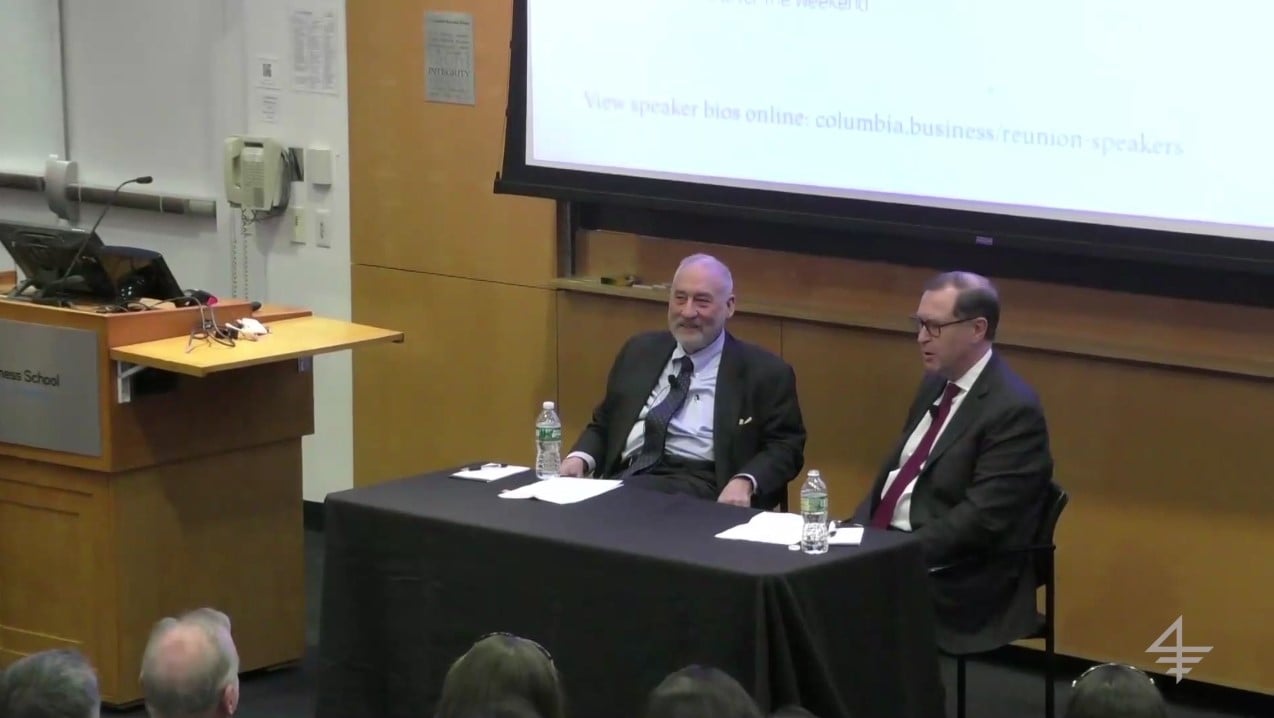Don’t miss this sharp analysis of today’s economic realities featuring Professor Joseph Stiglitz. Professor Stiglitz helped pioneer such pivotal concepts as theories of adverse selection and moral hazard, which have become standard tools of policy analysts and economic theorists.
Speakers:
Glenn Hubbard, Dean and Russell L. Carson Professor of Finance and Economics
Joseph Stiglitz, University Professor at Columbia University, Executive Director and Co-founder of the Initiative for Policy Dialogue, and 2001 Nobel Laureate in Economic Sciences
Keynote: The Future Of Globalization
Q1 hedge fund letters, conference, scoops etc
Transcript
I feel Joe like I have shadowed you much of my intellectual life. I have learned an immense amount from Joe Stiglitz his textbook with Tony Atkinson was the bible of students and in my generation in studying public economics we both were the chief economic adviser to normal presidents of the United States different of different political parties. And we both came of age in a profession where we could disagree and we have without questioning each other's integrity or each other's pursuit of the truth as we see it. So Joe we're talking about globalization. You have just been to China. I was saying to Joe I had just checked my Bloomberg on the way up. Both sides say that they are still talking and they hope to come to conclusions soon on a deal. What were you hearing about tariffs you know in this country we've been very focused on the bilateral trade balance. Some concern about intellectual property theft and also China's 2025 strategy. What were you hearing on the Chinese side or from Americans there about the U.S.-China tariff.
Well you know you can break up the interaction the conflict into several components and the roll out of discussion of all the components. I think underlying behold discourse are is the fact that 40 years ago China's per capita income was about one hundred fifty dollars per capita.
And no one could have imagined it would go from that to being in purchasing power parity which is standard way economies. The largest country in the world. And that even exchange rate it will be you know it's growing at even 5 6 percent and we're growing at two and a half percent. It's going to be much larger than us. Even unconventional measures within in 20 25 years. And so this is both a competitive shock that we you know are just beginning to to take hold of.
And it's a little bit of a security national security that people national security community have become anxious partly because some of the areas where they know it's really important like AI. China is comparable to us and some parts of it probably ahead of us. So then I think Koehler's the whole relationship and then you go to this very specific issue issues. And here I think unfortunately we're talking about our our president.
He obviously didn't learn very much Worton or maybe he learned what they taught. You know I don't know.
We don't know. But there's a problem. You know one of the things you're supposed to learn is that bilateral trade deficits aren't what's important. That is the multilateral trade deficit the multilateral trade deficit is as much a matter of macroeconomic policy as anything else when there is this disparity between domestic aggregate investment and domestic savings. We're going to have to import capital and that's the flip side of a trade deficit. And. We've been saving to go. And they've been saving a lot. And so the focus on blaming China for multilateral trade deficit is just wrong. If any trade agreement. The most it would do is shift the countries from which we would be importing. So we might not buy clothes from China we'll buy it from Vietnam and probably the same company will probably be a Chinese company was moved to Vietnam so it's not going to make any difference. It's not going to come back to the United States. We are not. Not very much. So part of the issue is that you have this very specific trade war going on about the trade deficit and the bilateral trade going on in the context of some really very deep and important issues.
And in that let me ask you about those because to be devil's advocate for a moment isn't President Trump absolutely right in calling out China's about actor. I remember I was one of.






